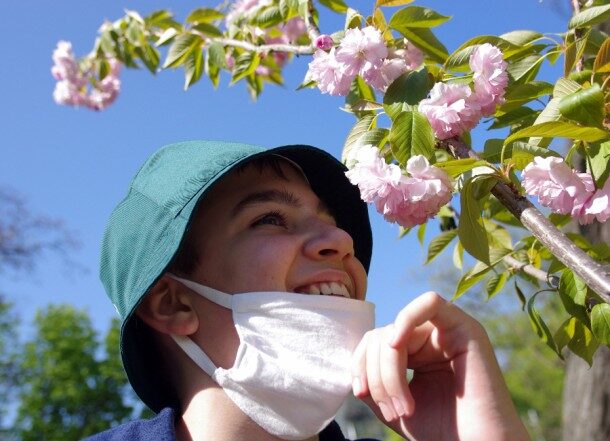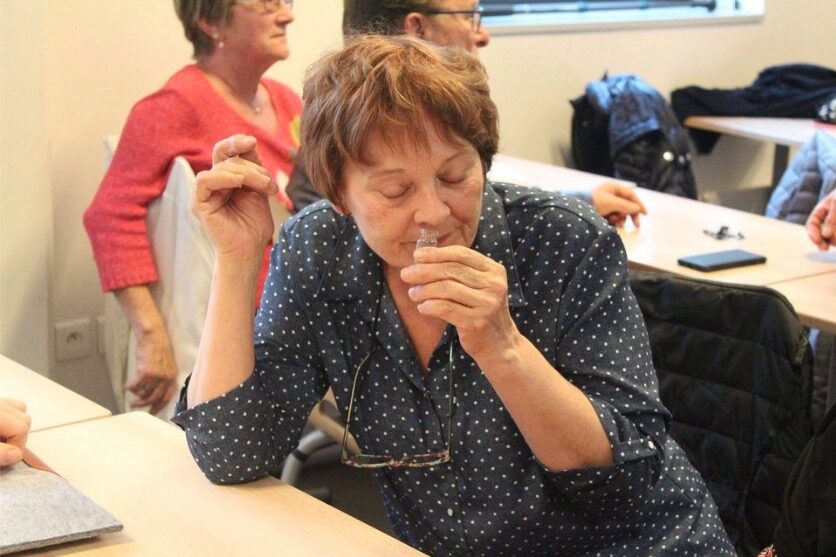Leo Newhouse, MSW, LICSW (Social Work, BIDMC) shares his experience with sudden loss of smell due to COVID-19 and discusses the importance the five senses bring to everyday life.
WorldCrunch – November 9, 2020
When COVID-19 Robs Your Sense Of Smell, Train The Brain To Get It Back

One of the most common symptoms of COVID-19, along with the even more common fever, dry cough and tiredness, is what is called anosmia: the sudden loss of the sense of smell. In some cases, this symptom can last for several months. And the longer it endures, the more of a psychological challenge it becomes. That is why doctors are recommending “olfactory training” to help patients recover their sense of smell more rapidly.
A frequent symptom: Studies suggest that the loss of the sense of smell is a pathognomonic symptom, meaning it is characteristic of a particular disease, in this case, coronavirus. “No other virus known until now has had this effect on the olfactory activity,” Hirac Gurden, research director in neuroscience at the French National Center for Scientific Research, told the French daily Les Echos. “If someone catches the flu, anosmia can persist in rare cases in the long term, but never appear overnight.”
- Approximately four out of every five coronavirus patients in France and Belgium experience problems with their sense of smell. In the United States, the numbers are higher still (86%).
- In France, while 70% of affected patients recover from anosmia one month after the infection, at least 8% of patients who lost their sense of smell during the first wave of infections still have not recovered it, raising concern that the condition may even be definitive.
- The exact cause of anosmia is still being studied, although neuroscientists at Harvard Medical School have discovered that the olfactory cell types in the upper nasal cavity are particularly vulnerable to infection by COVID-19.
Senses add richness and texture to everyday life; they are intricately tied in with our emotions
Psychological impact: While anosmia may not seem as disabling as other COVID-19 symptoms, it can still cause psychological distress, affecting a patient’s appetite and causing weight loss.
- Recent studies have associated the loss of the sense of smell with “depressed mood and anxiety,” much more than other symptoms experienced by patients.
- As Leo Newhouse, a senior social worker at Beth Israel Deaconess Medical Center who had first-hand experience with anosmia, wrote in the journal Harvard Health Publishing: “Our senses — smell, vision, hearing, taste, and touch — are bridges that connect us to the world we live in, to life itself. Knock out two of the five bridges, and 40% of our sensory input is gone. Senses add richness and texture to everyday life; they are intricately tied in with our emotions.”

Train your brain: No specific treatment or medication exists to treat anosmia. And yet, it is possible to train a patient’s brain to accelerate the recovery of the lost sense of smell.
- Before COVID-19, some already suggested that patients suffering from anosmia train themselves to smell odors from everyday life. The principle of mindfulness plays an important role. “If someone is used to drinking coffee in the morning, then he should train himself to smell it, by looking at it, focusing and taking a deep breath,” Dr Jérôme Lechien told Les Echos.
- The association Anosmie.org offers a free re-education protocol designed by German professor Thommas Hummel, the leading researcher in the field. It consists of two daily sessions for 12 weeks during which patients must try to recognize four to six odors of various essential oils (lemongrass, clove, eucalyptus, peppermint, etc). According to the protocol, it is also important for the patient to relax while doing the exercise, letting the odor come to her rather than trying to force it. “Our state of mind has a big influence on our olfactory perception,” according to the protocol.
- “Smelling all five scents twice, once after waking and once before sleep, started to feel less like training and more like a ritual, like lighting a stick of incense in church, calling up the origins of perfume itself,” Leslie Jamison, who followed a similar protocol after losing her sense of smell to COVID-19, writes in Vogue magazine.
- To accelerate the process, patients should also eat a lot of fruits and vegetables, which contain antioxidants and vitamin B and improve neural recovery.
Long-term takeaway: Patience and regularity are keys. Doctors have observed a quicker recovery for patients who followed the protocol — and stick with it for several months if necessary.

